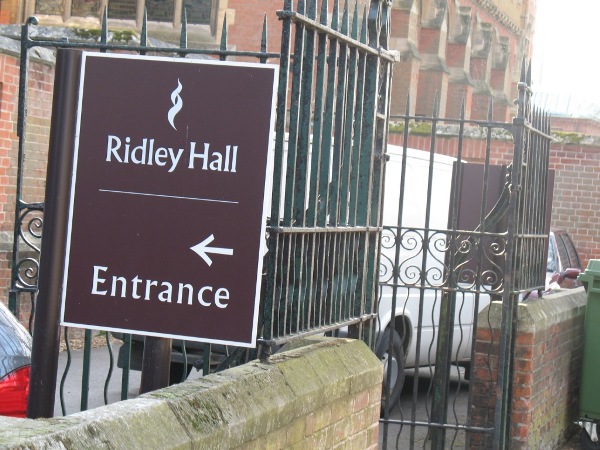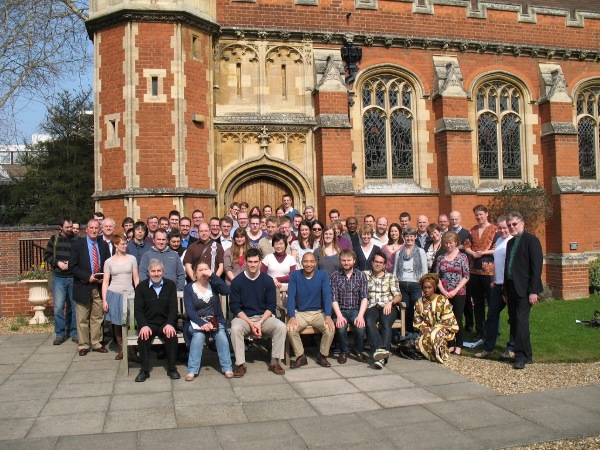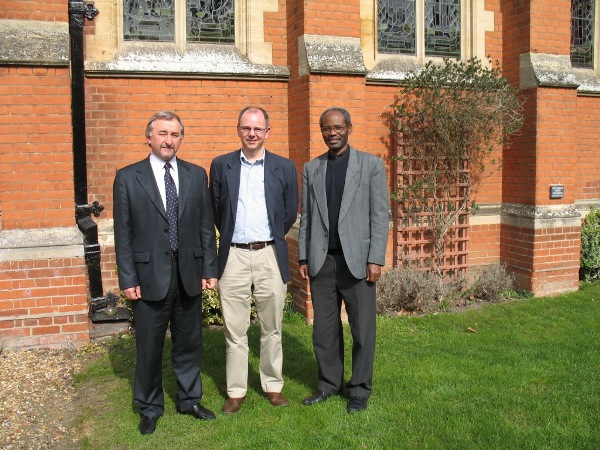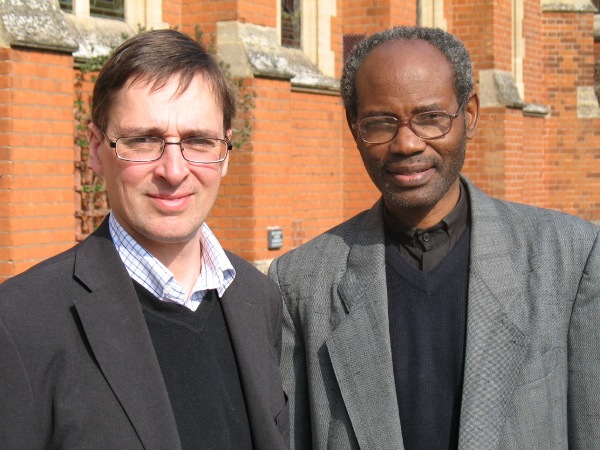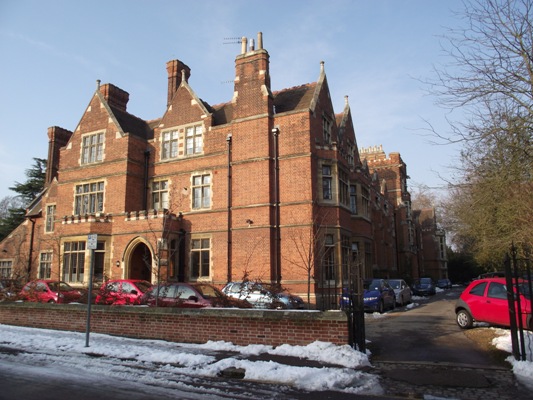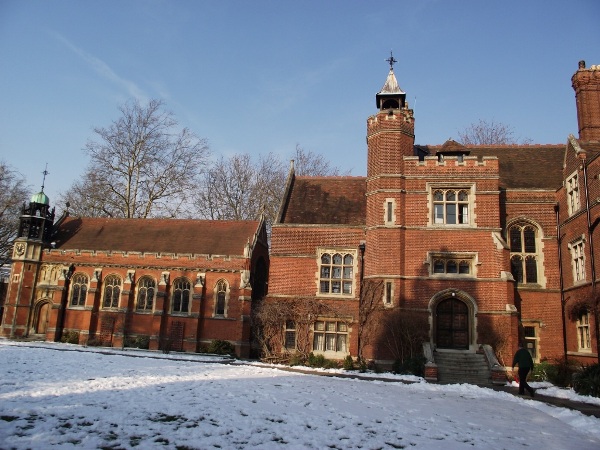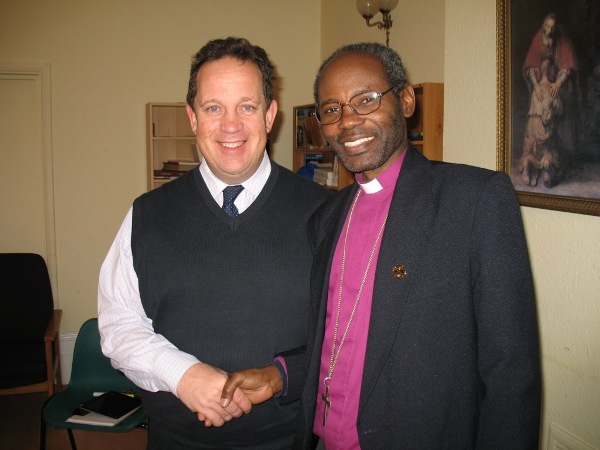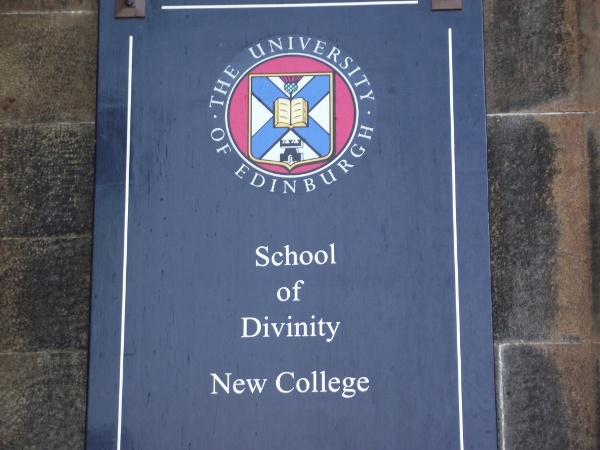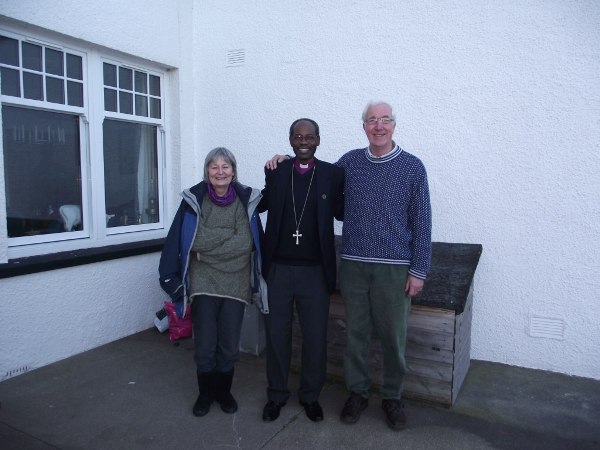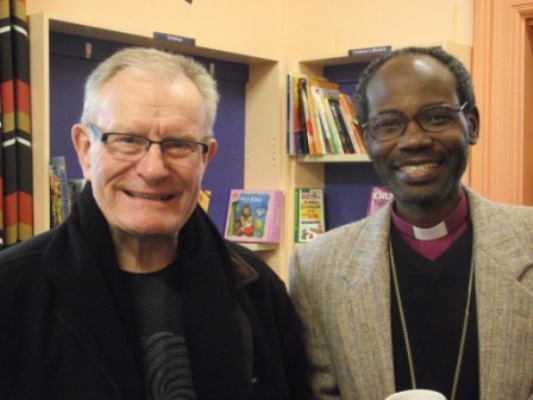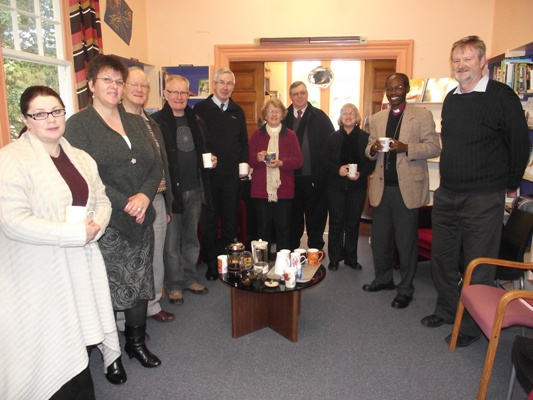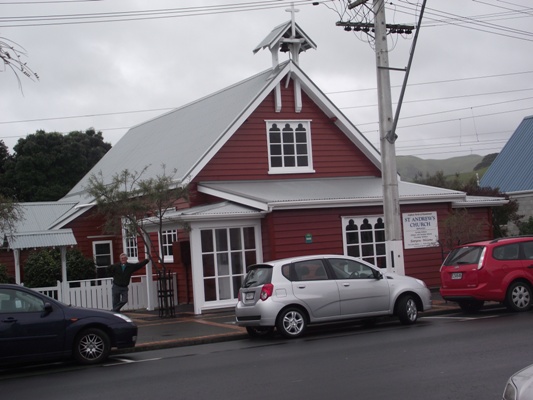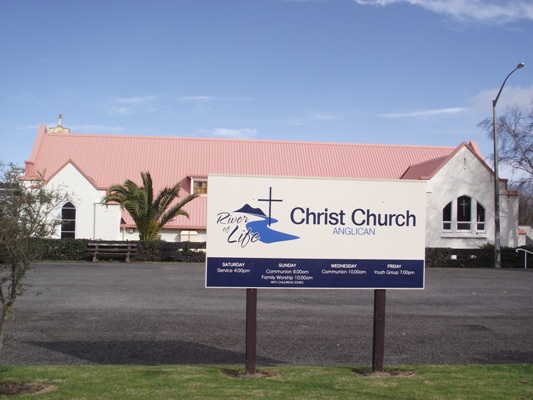Bishop Mwita's Blog
{/besps_c}
My Cambridge and UK Reflections (1 February to 31 March) - Rt Rev Mwita Akiri, PhD
Since I completed my doctoral studies at Edinburgh University in 1999, I have been visiting the UK frequently, almost once a year. However, in most cases my stay during those visits has always been brief, lasting only for days. This year I stayed in the UK for an extended period (almost three months), and notably, at an academic institution, in a largely academic city. This enabled me to reconnect and catch up with British academic and church life in a very special way.
I am grateful to Langham and Ridley Hall for giving me this rare opportunity to focus on my academic project. I have tried before to start writing a book but did not get very far. My demanding administrative and leadership responsibilities over the last twelve years or so contributed to this lack of progress. I am very pleased with the progress I have made during my time at Cambridge.
I was privileged to be a part of a vibrant worship community with dedicated and committed students and staff at Ridley Hall that was immensely rewarding. The visionary leadership of its Principal – Canon Andrew Norman – is obvious and remains a key factor in taking the College to a new level of success. I pray that the ongoing major College development appeal will be a success. I felt honoured to take part in the Round Table conference of the Church of England bishops on the training of the future clergy for the Church of England just days before I left the UK. The two-day conference – a step in the right direction – was jointly hosted by Ridley Hall and Westcott House – the two Anglican colleges at Cambridge.
I valued the opportunity to preach and to hold meetings with church leaders to discuss mission issues of local and international importance. As ever, British Christians, church leaders and individuals accorded me a very warm welcome and friendship – in their homes, in the churches and in the meeting rooms. I thank each one and all of them wholeheartedly for their unwavering support for me and the Diocese of Tarime. Forever, we are, and we remain brothers and sisters in Christ.
On November 23rd, 2011, Bishop Mwita Akiri lectured at Wyclyffe College on the Leadership Crisis and World Mission Today as part of the 2011 Sadlier Mission Lecture Series.
World mission today is facing formidable challenges from within and outside the Church. These challenges require strategic decisions and responses, both in the West and the Global South. This is a time when decisive and visionary leadership is needed. Unfortunately, church leadership is in crisis. What next? Click here to down load a PDF of the lecture.
Families & Accountability - written for THE LIVING CHURCH - June 19, 2011
By R. Mwita Akiri
We live in a world of God-given, non-accidental diversity. Some of this diversity is represented by our respective geographic, economic, cultural and social settings.
Like it or not, Anglicanism is diverse, and Anglicans themselves are diverse. Our Christian experiences and understandings differ from one another, as do our approaches to hermeneutics. We do not live in a world that allows us to confine ourselves within our own geographical, cultural and social contexts. The world we live in is a global village, and more than that, it has become a dot-com age. We have to relate with and to one another, within and outside our contexts.
Add to this another reality. The Anglican Communion is a family. Members of that family are found in thousands of cultures and locations. Yet it is common knowledge that relationships between and among the people of God have suffered greatly. Unfortunately, this context has made some of the members of the family suspicious of the intentions of the Anglican Covenant, especially regarding its notion of relational consequences.
No wonder the charge has been made that relational consequences reveal the Covenant to be an unchristian text concerned with conformity and punishment, not mutual respect. I disagree. What would lead one member of the Anglican family to assume the worst about other family members’ intentions? Why are relational consequences considered a threat?
Another wrong approach to the Covenant comes from those who regard it only as a document of the majority of Anglicans living in the Global South, who would have members of the Communion family own up to their disruptive behaviors and actions. This disregards the fact that disagreements over issues such as the blessing of same-sex unions are also found within the Global South. Such disagreements among Anglicans have played a part in the proposal of an Anglican Covenant, but are not limited to one locale of the Communion.
It is important to remember that Africa, like other continents, is going through cultural, social, political and economic transformations. It would therefore be wrong for anyone within or outside Africa to suggest that Africa can cope better with conformity and punishment, if these were indeed the goal of the Covenant’s relational consequences.
Let us not forget that Africa owes much of its historical Christian background to the West. Its Christian outlook is as diverse as that of other continents. Nonetheless, it may well be true that in Africa the value of the family, the pride of belonging to the family, and the need for its members to live harmoniously, is a value that most cherish. Even new urban and rural or other social networks have not disrupted or diminished this reality.
Relationships are about interdependence as much as they are about independence. They are about the rights and freedoms of individuals as much they are about the considerations of the necessary harmony and survival of the whole family. Relationships are about mutual respect.
In most cases in Africa, all members of the family have the obligation and the desire to belong. Not many, even the rich and the powerful, can cope easily with consequences of behaviors and actions that might lead to social exclusions, whether forced or self-imposed. It is for this reason that the overwhelming majority of Anglicans and Episcopalians in some parts of the Anglican Communion, for example in Africa, find no fault with the notion of relational consequences, and see it as seeking to enhance accountability and mutual respect.
The Rt. Rev. Dr. R. Mwita Akiri is the founding Bishop of the Anglican Diocese of Tarime, Tanzania. He is also a Research Professor of African Church History and Missiology at Wycliffe College, University of Toronto, since 2007. He is a member of the Anglican Consultative Council (ACC) and the Advisory Council of the Anglican Health Network.
The Living Church is published by the Living Church Foundation. Our historic mission in the Episcopal Church and the Anglican Communion is to support and promote the Catholic and evangelical faith of the one Church, to the end of visible Christian unity throughout the world.
My New Zealand Reflections – Rt Rev Mwita Akiri, PhD
In July 2011 I was able to visit New Zealand. The Anglican Board of Missions of the Anglican Church in New Zealand invited me to participate in the ‘Common Life Mission Conference’, and lead two workshops on world mission. The conference was a golden moment for world leaders and New Zealand Christians to reflect together on world mission. Thereafter I visited churches in the Diocese of Wellington and visited the Bishop of Wellington and his staff at the Anglican Centre.
My memories of New Zealand are still fresh. The opportunity to share with many Christians was rewarding and challenging. A live encounter with the best of the Maori culture and spirituality was exciting. The generosity of my hosts who provided hospitality and of the Anglican Christians in the Diocese of Wellington whom I met was humbling.
The enthusiastic response by individuals to the call to support mission in Tarime was very encouraging. New Zealanders were touched when they learnt that $5 was enough to buy a bed net that protects child from mosquito bites and malaria and save that child from death.
It is a long time since I saw people making spontaneous donations immediately after listening to a talk on world mission especially in the developed world (the West). The last time I witnessed it happen was when I was making a presentation to the Virginia Beach business community in the US in June 2006 on the need for an Anglican University to enhance the opportunities for university education in Tanzania as part of the policy of ‘higher education as mission’.
I was moved when I saw Christians in New Zealand, congregation after congregation, making spontaneous donations or pledges for malaria bed nets, giving what they could, and giving it with loving hearts. This looked very unusual especially in this age of global financial crisis and economic meltdown where people are very cautious about giving for God’s work, locally and overseas.
In one church, the Rector allowed his parishioners to ask questions, engage with me, and get clarifications before I left the pulpit! In the last 23 years or so I have been traveling to the West and giving talks or preaching, yet I could not believe this happening. A senior diocesan official who attends one of the churches where I preached undertook to organize further donations so that we could distribute more bed nets. What initiative! New Zealand was a blessing in every way.
My heart goes to the leaders of the Church in New Zealand – the Anglican Board Missions, Church Missionary Society (NZ) and the Diocese of Wellington. They realize that world mission can only succeed if we put mission high on the agenda of our local churches and give the ordinary member of our congregations a chance to engage in mission. Bringing world leaders and people from other contexts to our local contexts can encourage those involved in mission, and kindle the interest of the onlookers and the skeptics.
Yet it is a two way learning process. Delegates who attended the Common Life Mission Conference went back blessed also. I went back to Tarime feeling blessed and encouraged.
Tragic Deaths at Barrick Gold Mine in Tarime, Tanzania
On May 16, 2011 five young people were shot and killed on the spot by the police at Barrick Gold Mine in Nyamongo area, some 40km or so from Tarime town, east of Lake Victoria. Several others were wounded. Two of those wounded died later. I understand that some police officers suffered injuries too as a result of the chaos that took place on the fateful day.
The question that many of us are asking is this: when will these killings and battles end?
The relationship between Barrick North Mara Gold Mine and the local community surrounding the Mine continues to be a problem and a challenge to many stakeholders in Tarime, including the Anglican Diocese of Tarime.
The Diocese has 5 strategic churches and a food security and income generating project in the villages surrounding the Mine, some 35km or so away from Tarime town. So the Diocese is touched by this tragic incident.
The families of those who were killed refused to bury their dead for over 10 days awaiting legal experts to witness the post-mortem. As many would know from news reports on some Canadian media especially The Star, families of those killed say that the police took the bodies by force from the mortuary of the main hospital in Tarime and dumped them at night near the family homes some 40 km away. This has disturbed and saddened many. The police deny this, but the families didn’t take the bodies. Somebody did!
Put simply, with the permission of the government, Barrick came to Tarime and took away the plate of food from the table where many young unemployed people were eating. Then the investors asked those young people to go away, without look behind. This has not happened!
The unemployed young people have never gone away because neither the Mine nor the Government has given them something else to do to earn a living. So this problem is a national one: how to address youth unemployment.
It is alleged (and many believe this), that each day, there seem to be some quiet arrangement between the small scale miners and the police on duty that allows those young people to go into some of the mining areas. Each day those young people to go to the Mine pits in hundreds if not thousands. I have seen lots of them up and down the heaped waste rock from the pits as I visit the congregations that we have in the surrounding areas. Honestly I never knew those young people also go into the pits, and as it alleged, with the permission of the police and the security guards. What is unclear is whether the Mine authorities are aware of this.
It is also alleged that the shooting occurs only when there is a breakdown of communication. Otherwise, this practice goes on smoothly each day! The police deny the existence of such an arrangement.
Another thing that annoys the local community is the fact that there seem to be inadequate commitment on the part of Barrick to honor its promises to assist the community with generous funds for local community projects. Some of the projects include improving rough and dusty roads, contributing towards the construction or renovation/repair of primary and secondary schools and clinics for women and children and the general local population, plus the provision of clean and safe water as a way of returning a little compared to the big plate of food that Barrick took away from the mining community. It is believed that Barrick Gold do pay some money to the local government at district level for development purposes. But the local community argues that the amount is too small compared to what is taken from 'their land'.
The question is this. Can there be a long term solution to this ongoing problem? In my view, the answer is ‘Yes’. As the local Bishop in Tarime I believe that this can be achieved in a number of ways.
First, Barrick must allocate some portion of land to the young small scale miners where they can do the small scale mining freely. After all, this is exactly a government policy, but no one knows why it is taking years to implement it.
Secondly, there have to be other ways of diversifying the local economy so that jobs can be created for young people and the local population. The Anglican Diocese of Tarime is already trying to help in this area. Currently and through our Mogabiri Agricultural Centre, we have a food security and income generating projects in the villages surrounding Barrick Gold Mine. We serve over 2500 people. I wished that Barrick were able to join us in these efforts and other projects that would help create jobs or self employment for young people.
Thirdly, we have to increase the number of secondary schools and vocational training centers in the area. At the moment many young people move straight from school into informal employment (mining included) at a very young age. This is because many have nothing to do to earn a living. Barrick Gold could play a major role in this. In passing, let me mention that for girls, finishing school at an early age and having nothing to do leads to early marriages soon after the rite of passage, namely female genital mutilation.
Fourth, the government of Tanzania has to work with all key stakeholders such as religious leaders to help improve the relationship between the police and the communities even beyond the mining areas. At the moment, the local community does not trust the police and the police feel threatened. This situation has to be rescued.
Yet there are other complications. The community surrounding the Mine often votes for the Opposition party. Tarime as a district is a stronghold of the Opposition, though the current local MP is a member of the governing party. He unseated the Opposition candidate by few hundred votes in last year's General Election.
Despite all this and the nightmare of the presence of Barrick Gold, and non-ending conflict between Barrick and the local community, Tarime has lots of unique things and a great potential for development and progress.
It has hard-working people, variety of crops, cheaper farm foods, fertile soil that grows banana trees, maize, coffee, round potatoes, onions, cabbage, tomatoes, carrot, among others. There is plenty of gold too! The landscape is attractive too, divided largely between highland and lowland areas. Barrick Gold Mine is located in the lowlands
All of this makes our mission context very challenging indeed. Yet we remain focused. Despite the small resources at our disposal, we are evangelizing, teaching the disciples of Christ, building places of worship, teaching our people how to support the ministry, and are engaging in community development projects, among other initiatives.
God is with us. Do pray for us.
The Rt Rev. Dr Mwita Akiri
Bishop of the Anglican Diocese of Tarime, Tanzania
More Articles ...
RSS Feed from the Bishop of Tarime
Address: PO Box 410 , Tarime , Tanzania
Office / FAX: +255 (0)28 2690 153
Contact us via e-mail
